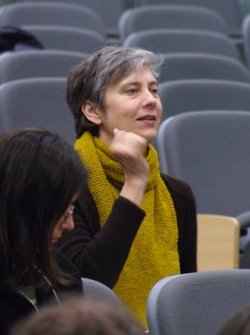Room: UTC 4.104
Description
Over the past 17 years, a good bit of work on discourse in Linguistics and Philosophy of Language presumes that a central pragmatic factor driving and constraining interpretation is the Question Under Discussion (QUD). The idea is central in the work of Ginzburg, van Kuppevelt and Roberts, and plays a part in work by Beaver, Büring, Jasinskaja, Kadmon, Pollard, Portner, van Rooij, Simons, and Zeevat, and their collaborators, inter alia; is closely related to the Inquisitive Semantics of Groenendijk and his colleagues; and is reflected more recently in an increasingly broad range of psycholinguistic research. This thread is also closely related to the extensive work on Planning Theory in AI (e.g. Cohen, Grosz & Sidner, Perrault, Stone, Thomason).
This course will give students some background in the basic concepts and empirical motivation for this approach to discourse pragmatics, and suggest links to other theories of discourse, including those involving Rhetorical Structure Theory (like the SDRT of Asher and Lascarides, and the Coherence Theory of Kehler) and game theory (as in the work of philosophers like van Rooij). It will consist of five hours of lecture and discussion, including the following topics:
- Basic empirical motivations: What kinds of problems in discourse pragmatics might benefit from the use of something like questions under discussion? As this is a very wide range of topics, we will focus mainly on anaphora resolution, focus, and presupposition projection, but will also include some discussion of the role of discourse particles in organizing and clarifying discourse.
- Basic concepts: What are questions and what role do they play in context? How are questions modeled in some of the theories of interest? How are theories involving the QUD related to classic theories of linguistic context, including the Common Ground-based contexts of Stalnaker, Kaplan’s contexts assigning values to dedicated indexicals, and theories using assignment functions or discourse referents for modeling constraints on anaphora resolution? How are questions in discourse related to alternative semantics, to the plans and goals assumed in Planning Theory?
- What does the QUD buy us from an explanatory point of view? How does the work which assumes its centrality in discourse essentially improve on earlier models of discourse context in linguistics and philosophy of language?
The goal of the course is to introduce students to the central issues and give a very brief overview of the literature and empirical results.
Prerequisites
Students should understand the basics of formal, compositional semantics. And they should have a grasp of some of the basic topics in pragmatics, especially formal pragmatics and its relationship to dynamic theories of interpretation. Useful guides to the latter might be the papers in Steven Davis' (1991) Pragmatics: A reader; Nirit Kadmon's (2001) Formal Pragmatics; Lawrence Horn and Gregory Ward's (2006) The Handbook of Pragmatics; and papers in the bibliographic links associated with the topics at: http://www.ling.ohio-state.edu/~croberts/QUDbib/.
Files
Lecturer
Craige Roberts
|
Bio:
Craige Roberts is Professor of Linguistics at The Ohio State University. She specializes in formal semantics and pragmatics and her principal research interests are in: - Anaphora, definiteness, and specificity
- Formal models of context in interpretation: Presupposition, focus, implicature, perspective, and domain restriction
- The semantics and pragmatics of modality, mood, tense, and aspect
As a student Craige studied under Barbara H. Partee at the University of Massachusetts at Amherst. She then held a postdoctoral fellowship at CSLI at Stanford where she was exposed to interdisciplinary work on pragmatics in the tradition of Grice, and work on Planning Theory in AI. Her work on pragmatics is driven by her interest in the nature of the human mind, and it has resulted in a deepening dialogue with colleagues in computer science, logic, philosophy, and psychology. She is involved in an interdisciplinary Pragmatics Initiative at The Ohio State University and is currently collaborating with David Beaver, Mandy Simons, and Judith Tonhauser on the NSF-funded project Projective Meanings: presupposition, conventional implicature, and other non-assertoric aspects of utterance meaning.
|

